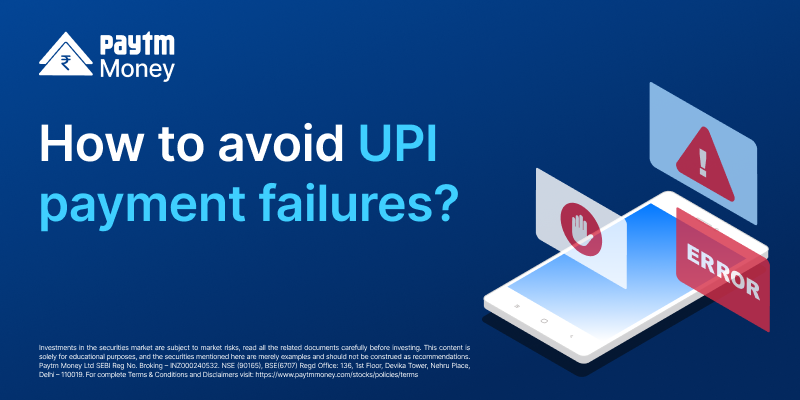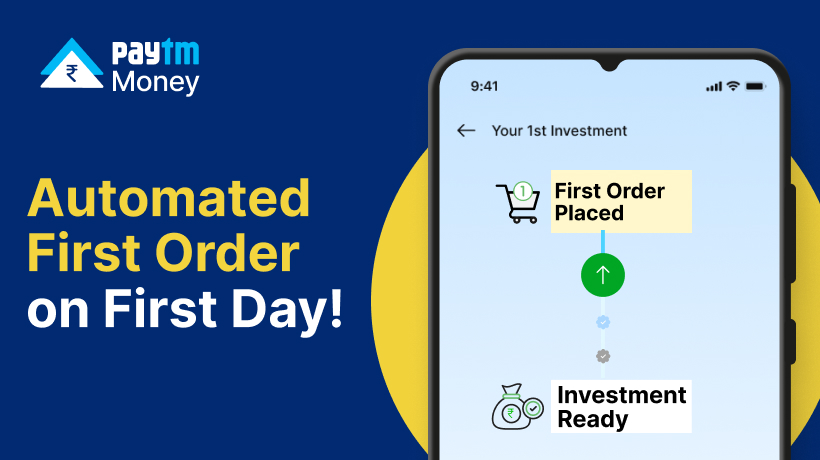Payment failures causing stress? Learn how to avoid them7 min read
Are you tired of constantly dealing with payment failures and the stress that comes with them? Look no further! In this blog, we will explore how you can make seamless UPI payments
The Unified Payment Service (UPI) offered by NPCI (National Payments Corporation of India) has become the preferred payment method for millions of people across the country due to its secure platform and hassle-free payment journey. UPI Payments are increasingly being used for both peer-to-peer (P2P) and person-to-merchant (P2M) transactions. Since its inception, UPI payments have made investing in the securities market simple.
As there are multiple parties involved in making UPI the fastest payment method, there are times when the UPI transactions fail due to a variety of reasons which may come up either due to technical glitches or human errors.
8 common reasons why UPI transactions fail
Below are some common reasons behind failed UPI transactions due to human errors:
-
The bank account used for making the payment is not a registered bank account
One of the most common errors which leads to failed UPI transactions is when the user selects one registered bank account on the merchant website while initiating the payment but tries to pay from another unregistered bank account on the payment service provider app.
This error is also called a “Third Party Validation” failure.
As per Securities and Exchange Board of India (SEBI) guidelines, transactions must be made by the users only from their registered bank accounts in order to provide seamless business transactions and secure user data and payments.
For example:
User ABC initiates payment via Bank A on Paytm Money for investing in stocks / mutual funds and selects Google Pay App to complete his payment. On landing on the Gpay app, the user selects Bank B and enters his UPI pin to complete the payment. This leads to the failure of the UPI transaction as the bank details mismatch.
-
Incorrect UPI PIN
While making a UPI payment, the user needs to authorize the transaction by entering the unique UPI PIN. If the user enters an incorrect UPI PIN, then the transaction fails. In case the user has forgotten the UPI PIN, they can visit the UPI profile on the mobile app, tap on the “Forgot UPI PIN” option and reset it.
-
The daily limit of UPI Payments is exceeded
There is a daily limit on the number of UPI Payments set by the bank for the users. Most banks put a daily limit of 10 UPI Payments per bank account. If the user has exhausted their limit, they can either use a different registered bank account or they can retry the transaction after 24 hours with the same bank account.
-
Insufficient Balance in Bank Account
This is a common reason for failed UPI transactions. It occurs in scenarios where the user tries to make a payment of an amount more than the available balance in his bank account. Users should always try to check the balance in their bank account before initiating a transaction in order to avoid such failures.
-
The UPI payment request expired
When the user enters his UPI ID (VPA) to make a payment on a merchant app, then a notification is sent to the user’s payment service provider app (mostly referred as PSP App) which needs to be authorized by the user for a successful payment.
This error occurs when the payment request is not accepted by the user within the time limit shown on the merchant app. The time limit varies between different merchants and is generally between 3–10 mins.
For Paytm Money, the time limit for authorizing the payment is 8 mins
For example:
User ABC initiates payment via Bank A on Paytm Money for investing in stocks / mutual funds by entering their UPI ID(VPA) like ‘abc@paytm’. The user will receive a notification on his Paytm app to authorize the payment. The time limit for authorizing the payment request is 8 minutes. If the user fails to accept the payment request, the transaction fails.
-
Incorrect UPI ID(VPA)
Firstly, let’s start with understanding what is a UPI ID / VPA (Virtual Payment Address).
VPA is basically a financial address unique to every user, which helps to send / receive money in the user’s account through UPI.
The benefit of using VPA to transfer money is that the user is not required to share the complex bank account details such as bank account number, and IFSC code to receive money. Moreover, VPA also offers an additional level of security for your transactions since neither the sender nor the receiver can find out the bank account details
If the user enters the wrong VPA while doing any transaction, the payment fails. Hence, the user should ensure entering the correct VPA before initiating a transaction. The user can locate the VPA by clicking on the profile section in the PSP App
-
The daily UPI amount limit is exhausted
The daily transaction limit is the maximum amount a user can transfer on a particular day via the UPI payment method.
Banks generally have a daily transaction limit of Rs 1 lakh, but it varies from bank to bank. If the user tries to transfer an amount greater than the limit, their transaction fails and hence all users should check the daily transaction limit allowed by their banks in order to avoid such failures
-
Incorrect bank account details of the receiver
The receiver is the person/merchant’s bank account to whom the money is being transferred.
The UPI transactions fail if the receiver’s account details such as bank account number, IFSC code or UPI ID is entered incorrectly. In such cases, the money is debited from the user’s account and gets transferred to the wrong account. This failure is most likely while making P2P (person-to-person) UPI transactions.
-
Freeze period for first-time user/user who has reset the UPI PIN
The cooling period is a time duration which is implemented by the banks if the user is a first user for UPI Payment or is an existing user but has reset his UPI PIN. This is done for security purposes.
The transaction limit of Rs 5000 is allowed to be transferred for 24 hours, after which the limits are relaxed to normal limits as set by banks. If the users try to make payments beyond these limits, then the UPI transaction fails.
For additional queries related to UPI payments, you can also visit the UPI FAQ section of NPCI
Did you know up to 4.7% of UPI transactions fail due to the above reasons?

Wrapping It Up
UPI Payments is one of the safest and easiest methods to make payments online. However, in case the user faces any difficulty while transferring the funds or if the UPI is not working then they can check if the payments are not going through due to any of the aforementioned reasons.
There are several benefits which UPI payments offer. Let’s take a look at some of them below:
- Easy registration journey
- Simple, secure and hassle-free process of making online payments
- Zero processing fees or transactions charges
(* as offered by NPCI currently, however, it can change in future as per NPCI’s latest guidelines)
- Real-time money settlement
- Access to multiple bank accounts via a single mobile application
Continue tapping into the benefits of UPI payments and keep playing a vital part in India’s story of financial revolution!
Customer Support
If you need any assistance, our dedicated customer support team exg.support@paytmmoney.com is always available to help 24×7, even though the market is open only for 6 hours a day.
You can choose from – Brokerage pricing, Mutual Funds, Stocks, F&O, NPS and Paytm Wealth Community. With multiple languages supported and proactive resolution from our Customer Support, you’ll get answers to all your questions.
What are you waiting for? Start investing with Paytm Money for your hassle-free payments.
Disclaimer: Investments in the securities market are subject to market risks, read all the related documents carefully before investing.This content is purely for information purpose only and in no way to be considered as an advice or recommendation. Paytm Money Ltd SEBI Reg No. Broking – INZ000240532. NSE (90165), BSE(6707) Regd Office: 136, 1st Floor, Devika Tower, Nehru Place, Delhi – 110019. For complete Terms & Conditions and Disclaimers visit: https://www.paytmmoney.com/stocks/policies/terms
Written By: Radhika Agarwal




